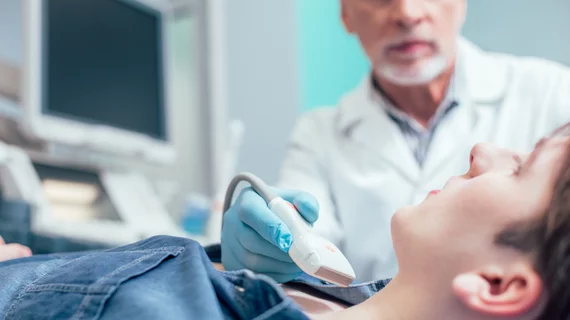Radiologist consultations after ultrasound imaging drop patient anxiety without prolonging exam time
Radiologist-led consultations after neck ultrasound can help decrease patient anxiety without prolonging exam time, according to a new analysis published Monday in Clinical Imaging.
While some have navigated sonography turf wars, the University Medical Center Groningen typically has rads both perform and interpret all scans of the neck. Previous studies have proven patients’ desire to receive MRI or CT results as soon as possible, and interact with radiologists. The Netherlands-based academic institution sought to explore these preferences in delivering neck ultrasound, conducting a prospective study with 109 patients.
Those who did not speak with the radiologist were significantly more worried during the exam, with much higher anxiety levels afterward. Nearly 93% said rad-patient consultations were important to them.
“Value-based healthcare is a concept that aims at improving patient outcomes by considering first those factors that matter most to patients without increasing costs. Our results indicate that a radiologist-patient consultation of imaging findings after neck US can be considered as value-based healthcare. Therefore, it can be recommended for routine implementation in clinical practice,” Ömer Kasalak, MD, PhD, with Groningen’s Department of Radiology, Nuclear Medicine and Molecular Imaging, and colleagues wrote Oct. 11.
Scientists conducted the study at a single unnamed center between February 2019-2020. One radiologist with six years of experience performed the neck ultrasound exams on consecutive outpatients, with 44 randomly assigned to communicate face to face afterward while the other 65 did not. In follow-up patient surveys, quality metrics — such as friendliness of radiologist, concern for the patient, overall exam rating, etc. — came back “good” or “very good” across both groups. Meanwhile, median duration of ultrasound exams with radiologist consultations was 7.57 minutes compared to 7.34 minutes without.
“This additional time is relatively insignificant, because in our series it was observed that patients are usually relieved and have no additional questions when informed about negative US findings,” Kasalak and colleagues wrote, adding that “patients generally reserve any questions about the management of positive US findings for their scheduled follow-up consultation with their referring physician.”

